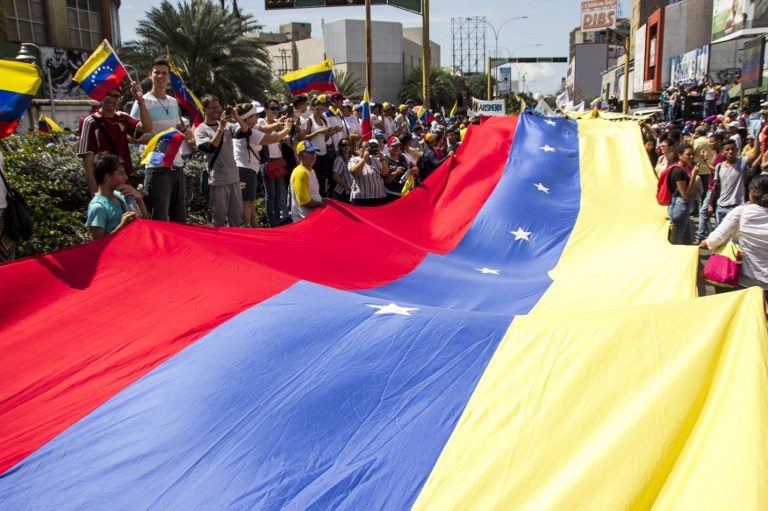SUMMARY
This is AI generated summarization, which may have errors. For context, always refer to the full article.

CARACAS, Venezuela – Venezuela’s opposition ratcheted up the pressure on President Nicolas Maduro at mass protests on Wednesday, October 26, announcing plans for a general strike, a new march and a legislative onslaught.
Opposition leaders called a 12-hour general strike for Friday, October 28 in the country, where an economic crisis has caused shortages of food and medicine.
They vowed to use their legislative majority to issue a declaration holding the leftist leader accountable for his handling of the chaos.
“We are going to notify Nicolas Maduro that the Venezuelan people declare he has abandoned his post,” the speaker of the National Assembly, Henry Ramos Allup, said to cheers from hordes of protesters in Caracas.
He said his side would deliver that ruling in a march on November 3 to the presidential palace.
Jesus Torrealba, secretary general of the opposition Democratic Unity Roundtable (MUD), also drew thunderous applause when he announced the general strike.
“Everyone stay home,” he urged Venezuelans.
Opposition activists put the protest turnout at 1.2 million in the capital, the largest in a day of nationwide demos.
Maduro held his own rally with thousands of supporters outside the presidential palace.
Clashes broke out at protests in other parts of the country.
Three people were shot in the northwestern city of Maracaibo, said Alfredo Romero, head of Venezuelan rights group Foro Penal.
In all, more than 20 people were injured and 39 detained nationwide, he said.
‘Coup’ claims
Venezuela is home to the world’s largest oil reserves but has plunged into economic crisis due to falling crude prices – leading to ever louder calls for Maduro to go.
His opponents accuse him of a “coup” after authorities last week halted a bid for a referendum on removing him from power.
The president says it is the opposition that is trying to stage a coup.
Analysts have warned of a risk of violent unrest in the volatile country.
Clashes at anti-government protests in 2014 left 43 people dead.
The opposition’s vow to march on the presidential palace next week raised the tone in the power struggle.
The palace was the scene of a short-lived opposition coup attempt in 2002 against Maduro’s late predecessor and ally, Hugo Chavez.
The head of the armed forces, Vladimir Padrino, who is also Maduro’s defense minister, declared “unconditional loyalty” to the president on Tuesday.
Maduro held a meeting of his National Defense Council on Wednesday.
In televised comments at the gathering, he called for “political dialogue and peace in Venezuela.”
The council comprises top officials including the defense and security ministers.
President’s trial demanded
Maduro calls the economic crisis a capitalist conspiracy. The opposition blames his economic management.
A recent poll found that more than 75% of Venezuelans disapprove of Maduro. But he has vowed to resist efforts to sack him before his term ends in 2019.
On Tuesday, October 25, lawmakers voted to stage a “political and criminal trial” against him.
But the Supreme Court has overruled the National Assembly’s decisions ever since the opposition majority took control in January.
Maduro’s opponents say he controls the courts and the electoral authorities and has used them to block the referendum.
“The MUD has the political capital, but the government has the power,” political scientist Luis Salamanca told Agence France-Presse.
Tricky talks
Maduro claims to have the Vatican’s backing to hold a “national dialogue” with opponents beginning next Sunday.
The MUD, a fractious coalition that tends to the center right, said it would only agree to talks if the government respected the constitutional right to a referendum and freed its imprisoned activists and leaders, among other demands.
They insisted any talks be held in Caracas – not on the Caribbean island of Margarita as Maduro proposes.
The blocking of the referendum “has brought the political conflict to a critical point,” Salamanca said.
“It is vital to avoid the conflict escalating into bloodshed. If dialogue can serve any purpose, it is to avoid that.” – Rappler.com
Add a comment
How does this make you feel?
There are no comments yet. Add your comment to start the conversation.